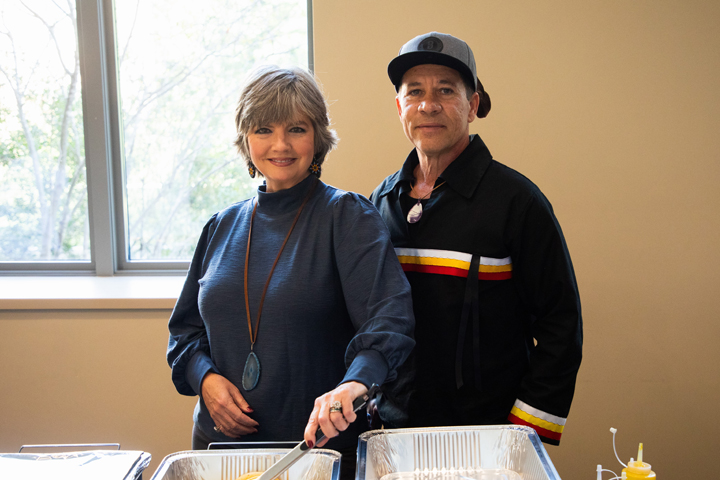On Sunday, Oct. 8, amidst the vibrant colors of changing leaves, the Indigenous Peoples Feast marked its debut at William & Mary, unfolding as a celebration of both culinary heritage and the crucial pursuit of Indigenous food sovereignty. Around 200 community members visited William & Mary’s School of Education to experience traditional and contemporary Indigenous dishes, spanning an array of flavors, each telling part of a unique story.
“You being here is part of a revolution,” Troy Wiipongwii M.P.P. ’18 (Chickahominy) told the crowd. The chief architect of the event, Wiipongwii’s gathering bridged the past and present by introducing diverse traditional and contemporary Indigenous dishes.
Currently, Wiipongwii serves as affiliated faculty in the W&M Blockchain Lab in the Global Research Institute, and will serve as director of innovation and entrepreneurship in conservation at the Institute for Integrative Conservation at W&M. The Indigenous Peoples Feast advances Wiipongwii’s research into Indigenous food sovereignty, funded in part by The Thomas F. and Kate Miller Jeffers Memorial Trust, and undertaken alongside Assistant Professor of Kinesiology Zach Conrad and Director of W&M’s Biology Graduate Program Matthias Leu.
“There are several isolated Indigenous food sovereignty initiatives happening in Maryland, North Carolina and Virginia. … The connecting point between all of these efforts [is] food consumption. Getting people excited about food and explaining how all these little things connect to bring the food to the table is, for me, the recipe for building that coalition,” Wiipongwii said.
Wiipongwii’s coalition included Lonnie and Ginger Custalow (Mattaponi), proprietors of Mattapony Reserve, who provided bison meat pies; Jasmine Anderson (Annishinaabe, Pamunkey) who delivered Indian frybread tacos; Joe Rocchi (Pamunkey) who provided soups, venison, and a vegetarian dish based on the agricultural concept of the Three Sisters; and Tomalita Peterson (Lumbee) of Lumbee Girl, who made collard greens and chow chow along with a chicken and pastry dish. Rounding out the offerings were dishes by Wiipongwii himself, who sought to use Indigenous ingredients to put a unique spin on other cultures’ dishes: a vindaloo-inspired chicken dish, a take on Cantonese duck, a wild-rice jollof made in collaboration with Nikardi Jallah Hynes and an Indigenous shrimp dish using burdock root. Each dish was a testament to the Indigenous movement for food sovereignty and a call for recognition of unique Indigenous culinary identity.

Completing the Indigenous coalition was Chief Lynette Allston (Nottoway), who reflected on students from the Brafferton school; Beth Roach (Nottoway), who spoke on the topic of heirloom seeds; W&M American Indian Student Association representative Dakota Kinsel ’26 (Diné), who read the university land acknowledgement; and Ben Walters (Nottoway), who read the Tuscarora Thanksgiving address.
By introducing traditional Indigenous flavors to extant cuisine, Wiipongwii seeks to reaffirm sustainable food practices: “A change in consumer preferences for more distinct cultural and culinary experiences and demand for local and sustainable products will lead to an increased demand for a biodiverse diet,” he explained. A data scientist by training, Wiipongwii’s gastronomic research is data-driven, seeking to “demonstrate herb, spice and food substitutes to make cuisines people may be familiar but with more local and sustainable food products.”
This culinary excursion offered a powerful statement of autonomy, pride and resilience within Indigenous communities, while supporting the preservation of food systems in the face of historical and modern challenges.
“The feast exposes the audience to both culturally relevant but also sustainably sourced foods and the potential for what is possible to eat if we focus our attention to the isolated efforts going on in the community,” Wiipongwii said.
Rocchi remarked, “Our foods literally changed the face of the planet.” Describing himself walking down a street in his hometown of Philadelphia, Rocchi said he observed multiple cultures represented by restaurants on a single block. “Let’s make it so 10 to 15 years from now, you’ll see Native American restaurants,” he said.

Colonization, displacement from ancestral lands and modern industrial agricultural practices disrupted traditional food systems. A loss of knowledge and skills, access to native ingredients and climate change all pose added complications: Erratic weather patterns affect the growth and availability of crucial crops and ingredients.
“Food sovereignty will be necessary and important in the future to survive,” Lonnie Custalow told the attendees. “Teach your children to love and care for the Earth.”
Wiipongwii called upon a range of partners to develop and execute this event: W&M Strategic Cultural Partnerships, InvestSWVA and Nottoway Indian Tribe of Virginia were among local supporters, while The REED Center for Ecosystem Reintegration and the Baltimore American Indian Center provided support from Maryland. Indigenous artist Keenan Stewart (Chickahominy), who also performs under the name 3KTrae, provided entertainment to end the evening.
While the feast at William & Mary was a one-day event, it represents a step in Wiipongwii’s broader research interests. By acquainting attendees with the culinary practices of numerous Indigenous peoples, the feast sparked a dialogue about the importance of preserving Indigenous food systems and advancing sustainable agricultural practices and biodiversity.
Wiipongwii’s reflections captured the essence of the day and the way forward: “We can attach similar but different meanings to what Indigenous foods means which allows for the flexibility to accommodate many peoples’ wants and desires even as we work toward sustainable agriculture and consumption.”
Editor’s note: William & Mary is recognizing the 300th anniversary of the Brafferton Indian School this year, exploring its complex history and the university’s ongoing relationship with Virginia Indian tribes. On Oct. 9, the day after the Indigenous Peoples Feast, representatives from the Virginia General Assembly presented the university with a proclamation honoring the students of the Brafferton Indian School and their descendants, and commemorating the history and culture of Indigenous people. President Katherine A. Rowe and student leaders of the American Indian Student Association accepted the award.

